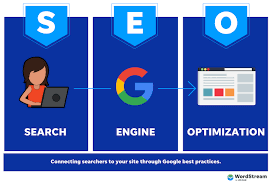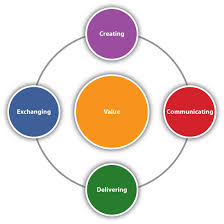Search Engine: The Gateway to the Internet
In today’s digital age, search engines have become an integral part of our daily lives. From finding information on a topic to purchasing products online, search engines have made it easier for us to navigate the vast expanse of the internet. But what exactly is a search engine, and how does it work?
A search engine is a software program that searches for information on the internet based on keywords or phrases entered by the user. The most popular search engine in the world is Google, which processes over 3.5 billion searches per day. Other prominent search engines include Bing, Yahoo!, and DuckDuckGo.
When a user enters a query into a search engine, the program scours its database of web pages to find relevant results. The process involves three main steps: crawling, indexing, and ranking.
Crawling is the process of discovering new web pages on the internet. Search engines use automated bots called spiders or crawlers to follow links from one page to another and gather information about each page they visit.
Indexing involves storing and organizing the information collected by the crawlers into a massive database called an index. This allows search engines to quickly retrieve relevant results when a user enters a query.
Ranking determines the order in which results are displayed on a search engine results page (SERP). Search engines use complex algorithms that take into account various factors such as relevance, authority, and popularity to rank web pages.
Search engines have revolutionized the way we access information online. They provide us with quick and easy access to vast amounts of data that would otherwise be difficult or impossible to find. However, with great power comes great responsibility.
As users, we must be mindful of our online behavior and use search engines responsibly. This includes verifying sources before sharing information and avoiding clicking on suspicious links or ads.
In conclusion, search engines are an essential tool in today’s digital age. They provide us with a gateway to the internet and allow us to access information quickly and easily. However, it is important to use search engines responsibly and with caution to ensure a safe and productive online experience.
Answers to Commonly Asked Questions About Search Engines
- What is the best search engine?
- What is the top 5 search engines?
- What is the top 3 search engine?
- What are 10 search engines?
- What is search engine and example?
- What are the examples of search engine?
- What are the 5 types of search engines?
- Which search engine is better than Google?
- What is a search engine and examples?
What is the best search engine?
The answer to this question depends on the user’s needs and preferences. Some popular search engines include Google, Bing, Yahoo!, DuckDuckGo, and Baidu.
What is the top 5 search engines?
The top 5 search engines, based on their market share as of January 2021, are:
Google – With a market share of over 92%, Google is the most popular and widely used search engine in the world.
Bing – Owned by Microsoft, Bing is the second-largest search engine with a market share of around 2.5%.
Yahoo! – Although not as popular as it once was, Yahoo! still holds a significant market share of around 1.5%.
Baidu – Based in China, Baidu is the largest search engine in that country and has a global market share of around 0.7%.
5. Yandex – The most popular search engine in Russia, Yandex has a global market share of around 0.5%.
What is the top 3 search engine?
The top 3 search engines in the world, based on market share, are:
- Google – with over 92% of the global market share, Google is by far the most popular search engine in the world. It processes billions of searches every day and offers a wide range of services such as email, cloud storage, and online advertising.
- Bing – owned by Microsoft, Bing is the second most popular search engine with a global market share of around 2.5%. It offers similar features to Google such as web search, image search, and news search.
- Yahoo! – once a dominant player in the search engine industry, Yahoo! has seen its market share decline in recent years. However, it still holds a global market share of around 1.5% and offers web search, news search, and other services such as email and online shopping.
It’s worth noting that there are other popular search engines in certain regions or countries that may not have a significant global market share but are still widely used by local populations. These include Baidu in China and Yandex in Russia.
What are 10 search engines?
Here are 10 popular search engines:
Bing
Yahoo!
DuckDuckGo
Baidu (China)
Yandex (Russia)
AOL Search
Ask Jeeves
Wolfram Alpha
10. Internet Archive
What is search engine and example?
A search engine is a software program that searches for information on the internet based on keywords or phrases entered by the user. The most popular search engine in the world is Google, which processes over 3.5 billion searches per day. Other prominent search engines include Bing, Yahoo!, and DuckDuckGo.
For example, if you want to find information about a specific topic such as “best restaurants in New York City”, you can enter this query into a search engine like Google. The search engine will then crawl through its database of web pages to find relevant results and display them on a search engine results page (SERP). You can then click on one of the results to access more information about the topic you searched for.
What are the examples of search engine?
There are several examples of search engines, including:
- Google – the most popular search engine in the world, accounting for over 90% of all internet searches.
- Bing – a search engine developed by Microsoft that offers web, image, and video searches.
- Yahoo! – a search engine that provides web and image searches, as well as news and email services.
- DuckDuckGo – a privacy-focused search engine that does not track user activity or store personal information.
- Baidu – the most popular search engine in China, offering web and multimedia searches.
- Yandex – a Russian search engine that provides web and image searches, as well as email and cloud storage services.
- AOL Search – a search engine owned by Verizon Media that provides web, image, news, and video searches.
- Ask.com – a question-and-answer-based search engine that provides answers to specific queries rather than just links to web pages.
- WolframAlpha – a computational knowledge engine that provides answers to factual questions using algorithms rather than traditional keyword-based searching.
These are just some examples of the many different types of search engines available today for users to find information online.
What are the 5 types of search engines?
There are several types of search engines available, each with their own unique features and capabilities. Here are five common types of search engines:
- General Search Engines: These are the most common types of search engines, such as Google, Bing, and Yahoo!. They allow users to search for a wide range of topics across the internet.
- Meta Search Engines: These search engines do not have their own databases but instead gather results from multiple other search engines and display them on one page. Examples include Dogpile and Metacrawler.
- Vertical Search Engines: These search engines focus on a specific topic or industry, such as health, travel, or shopping. They provide more targeted results for users searching within a particular niche.
- Local Search Engines: These search engines focus on providing results for a specific geographic area. They are particularly useful for finding local businesses and services in a particular region.
- Academic Search Engines: These search engines focus on academic research and scholarly articles. Examples include Google Scholar and Microsoft Academic.
Each type of search engine has its own strengths and weaknesses, so it’s important to choose the right one based on your needs and preferences.
Which search engine is better than Google?
Google is the most popular search engine in the world, and it is widely regarded as one of the best search engines available. However, there are other search engines that offer unique features and advantages over Google, depending on your specific needs and preferences.
For example, if you are concerned about online privacy and tracking, you may prefer to use a search engine like DuckDuckGo. This search engine does not track your search history or personal information, providing a more private browsing experience.
Another alternative is Bing, which is owned by Microsoft. Bing offers similar features to Google but may provide different results based on its ranking algorithm. Some users also prefer Bing’s image search feature over Google’s.
Ultimately, the best search engine for you depends on your personal preferences and needs. It may be worth trying out different search engines to see which one works best for you.
What is a search engine and examples?
A search engine is a software program that searches for information on the internet based on keywords or phrases entered by the user. The search engine scours its database of web pages to find relevant results and displays them on a search engine results page (SERP).
Some examples of popular search engines include:
- Google – the most widely used search engine in the world, processing over 3.5 billion searches per day.
- Bing – Microsoft’s search engine that offers similar features to Google, including web, image, and video search.
- Yahoo! – a web portal that provides news, email, and other services in addition to its search engine.
- DuckDuckGo – a privacy-focused search engine that does not track users’ online activity or store their personal information.
- Baidu – the leading search engine in China, offering web and multimedia searches as well as other services such as maps and news.
There are many other search engines available, each with their own unique features and strengths.




